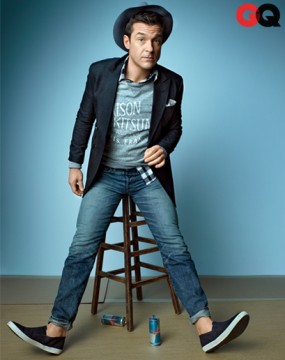If, like me, you file blog posts from a climate-controlled office in a well-governed, comfort-obsessed city, then the kind of war-zone reporting that Nation correspondent Jeremy Scahill does is hard to fathom and more than a little terrifying. So it was fascinating to hear Scahill tell the audience at a private screening room what unsettles him: the rapid-fire prattling that takes place on the 24-hour cable networks. ‘Dirty Wars’ Documentary: Journalism & Media Culture “In the [war] zones themselves, there’s a collegial, non-competitive atmosphere,” Scahill said Monday night at a Q&A session that followed a screening of his and director Richard Rowley’s must-see documentary, Dirty Wars . “People,” he added — and what he meant were war correspondents reporting outside “the bubble” of the embedded press corps — “want to make sure that everyone makes it in and out alive, and they encourage good journalism.” By contrast, he added, “Back in the states, when you go on cable television, it’s like entering the Twilight Zone where you have these pundits, that know everything about nothing” and ask “the most ludicrous, ridiculous questions” when they invite reporters like Scahill on their shows. “In general, the media culture is lazy,” he said. With the exception of a brief heated scene that shows Scahill tangling with NBC Chief White House Correspondent Chuck Todd, Dirty Wars is not specifically an indictment of the kind of in-the-tank news reporting that is found too frequently on TV and on the web, but, by example, it is. “This is a story about the seen and the unseen,” Scahill says at the beginning of the film, and, more importantly, it’s a story about doing the hard and often dangerous work required to drag the unseen into the light. In this gripping film, which will surely spark debate on those very same cable news outlets as its summer release date approaches, Scahill and Rowley leave “the bubble” of conventional war-reporting in Afghanistan to uncover a much darker and unsettling tale about U.S. military operations overseas. Through Scahill’s dogged reporting in dangerous territory that eventually includes Yemen and Somalia, Dirty Wars show how the conventional war in Afghanistan was eclipsed by a covert and, one could argue, reckless war of targeted killings and attack-and-grab raids quarterbacked by William McRaven, the commander of the Joint Special Operations Command from June 2008 to August 2011. Osama bin Laden’s Assassination One of JSOC’s success stories is the assassination of Osama bin Laden, and, in the aftermath, McRaven moved from the shadows to the spotlight, when President Obama appointed him Commander of U.S. Special Operations Command (SOCOM) which oversees all of the military’s special operations. McRaven’s strategy of targeted kills has since been lauded in the media and in Washington, but Dirty Wars shows that some operations have been far from surgical. The documentary contains footage of dead infants and children killed in the strikes along with the grief-stricken and furious survivors one of whom refers to the attackers as “American Taliban.” Journalists are not safe either. President Obama is going to have some explaining to do when the film is released, and one of the movie’s more chilling sequences indicates that he pressed for the continued imprisonment of Yemeni journalist Abdulelah Haider Shaye after Shaye reported that the U.S. was involved in the 2009 airstrike on a Yemeni village. The carnage of that attack is particularly harrowing, as is the film’s recounting of the killing of the 16-year-old son of American-born cleric Anwar al-Awlaki, the first U.S. citizen to be targeted for assassination without due process. Like his father, Abdulrahman al-Awlaki was obliterated by an unmanned drone, “killed not for who he was,” Scahill says in the documentary, “but for who he one day might become.” The Human Cost Of Military Operations One of the strengths of Dirty Wars is that it palpably conveys the human cost of these military operations, and, by the closing credits, the moviegoer is left with the distinct impression that the U.S. is building a reservoir of ill will overseas that could come back to bite us in the ass down the road. It could affect us here in other ways, too. After the screening, I asked Scahill — who’s also the author of the bestselling book Blackwater: The Rise of the World’s Most Powerful Mercenary Army — if there was a chance of JSOC’s strategy influencing U.S. law enforcement techniques. He explained that while he didn’t think that “President Obama is going to authorize a hit against a militia guy in Idaho reading his survivalist ‘zine,” he did have “serious concerns over the use of drones for domestic surveillance.” But rather than play pundit, Scahill brought the discussion full circle: “I’m a firm believer that, above all, we have to have our facts straight,” he said. “The reality we face is bad enough, we don’t need to exaggerate. Let’s confront this on what we can prove.” Follow Frank DiGiacomo on Twitter. Follow Movieline on Twitter.

Read the original post:
‘Dirty Wars’ Exposes America’s Expanding Covert Warfare Strategy (And Our Lazy Media Culture)

























